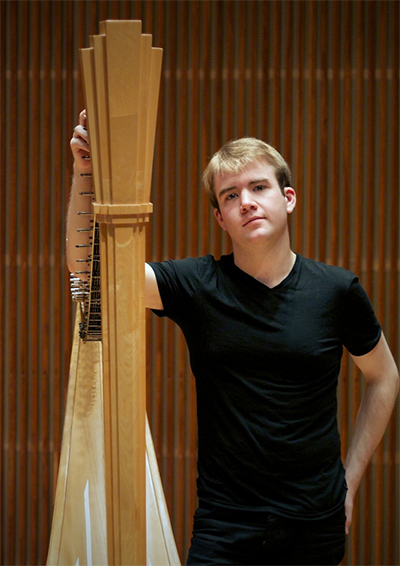by Nicholas Stevens

Trinity artistic director Todd Wilson served as master of ceremonies and conductor for the lunchtime concert on April 24, which bore a dedication to the late harpist Ashly Whitmer Correa and was co-sponsored by the Foundation that bears her name. Accompanied by the Trinity Chamber Orchestra, Ramsay opened with Handel’s lone concerto for the instrument. Each movement has a breezy, laid-back feel, in part because Handel’s sensitivity to the soft solo instrument led him to score for strings in an exceptionally delicate fashion. Ramsay played with assurance, taking advantage of the space’s good acoustics in phrases that ranged from whisper-soft to palpably present.
Rolled chords unfurled at carefully considered paces in the slow second movement, and an uncertain start for the violins in the third movement hardly held Ramsay back as he swept through chromatic passages.
A concert highlight arrived with his rendition of Fauré’s Une châtelaine en sa tour, a gorgeous, moody showpiece from the composer’s final six years. Drawing clear, bright harmonics out of the harp’s upper strings with little more than a twist of the palm, Ramsay gave coherence to an enigmatic series of impressions.
Marcel Tournier’s Féerie, a depiction of magical miniature worlds, offers a catalogue of the impressionist gestures that serve as a harpist’s bread and butter. The performance slunk and burbled along with Ramsay’s capable hands often in motion, though a blurry entrance of the violins threatened to throw the ensemble off. Even the trill of a long-ringing cell phone could not defeat the undeniable harmonic logic of William Bliss’s It Is Well With My Soul, nor Ramsay’s tightly managed escalation from simplicity to grandeur.
Ramsay brought an almost guitar-like twang to the harp’s middle register in Fauré’s Impromptu in D-flat. Here, more than anywhere else on the program, the correlation between Ramsay’s technical prowess and aesthetic sensibility became clear. In making harmonics sound from his low strings, he emphasized an organist’s approach to bass notes that pervades most of the composer’s music. In giving the sound of the top octave a brittle edge, he pushed toward an understanding of Fauré as a modernist.
Debussy’s Danse sacrée et danse profane, which ended the concert, came across as a less-inspired composition than either of the earlier Fauré pieces, though Ramsay handled the well-known work with characteristic care. The elder composer’s music sounded fresher and more modern, less beholden to preconceived design and instead overflowing with good ideas. Nonetheless, Ramsay made the most of it, and no doubt sent many listeners into an afternoon newly and subtly charged with an air of mystery.
Published on ClevelandClassical.com May 6, 2019.
Click here for a printable copy of this article



